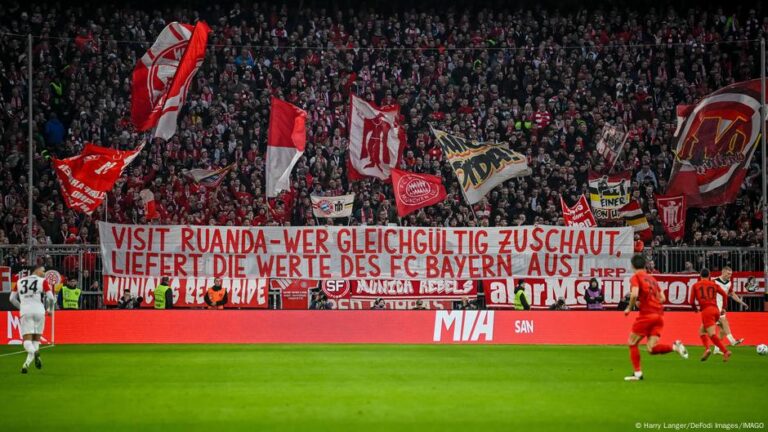“We are dealing with it, of course. I have personally sent two employees to Rwanda to monitor the situation. Our colleagues will return this week and report back.”
Those were the words of Bayern Munich CEO Jan-Christian Dreesen to DW at the beginning of February. There has been no word since.
Dreesen was responding to comments from DR Congo’s (DRC) Foreign Minister, Therese Kayikwamba Wagner, who had called on clubs who deal with Rwanda to end their agreements.
“Countless lives have been lost; rape, murder and theft prevail. Your sponsor is directly responsible for this misery,” she wrote at the time.
Rwanda has backed the M23 rebel group as they capture territory in a bloody conflict in neighboring DRC.
“M23 has been complicit in and responsible for committing serious violations of international law involving the targeting of women and children in situations of armed conflict in the DRC including killing and maiming, sexual violence, abduction, and forced displacement,” reads a United Nations report on the group.
A repeated request for comment for this story went unanswered by the Bundesliga club, with the sponsorship deal set to run until 2028.
Fan pressure
The deal has been met with opposition by some Bayern fans, most notably when a banner was raised behind the goal in a match against Eintracht Frankfurt in February:
“Visit Rwanda — Whoever looks on with indifference is betraying the values of FC Bayern,” it read.
This referenced the words of Bayern President Herbert Hainer, who had said: “We must stand united against divisive forces that undermine democracy. Anyone who looks on indifferently is putting democracy at the mercy of its enemies” in relation to Germany’s recent general election.
Bayern fan groups see this as hypocritical, given that Rwandan President Paul Kagame won 99% of the vote in the country’s 2024 election, has scrapped term limits and faces no real opposition. Rwanda’s sports ministry also ignored a request for an interview from DW.
German government takes action on Rwanda
Bayern can no longer fall back on the position of the German government to justify its partnership in Rwanda, which Dreesen said means “Bayern can become active on the African continent and gather important experiences” as well as “help Rwanda grow in sports with projects for youth football.”
In March, the German government restricted the terms of its bilateral cooperation agreement with Rwanda and put a halt to any new funding.
“The German government, like the European Union and the Security Council of the United Nations in its Resolution 2773, has repeatedly expressed its views on the situation in Eastern Congo and on the actions of the M23, which is supported by Rwanda, and of the Rwanda Defence Forces (RDF), including the capture of the provincial capitals of Goma (North Kivu) and Bukavu (South Kivu). We utterly condemn these actions,” a statement read.
Rwanda soon hit back, with the ministry of foreign affairs and international cooperation saying the measures were “wrong and counterproductive” and “let the DRC off the hook.”
“Countries like Germany that bear a historical responsibility for the recurring instability in this region should know better than to apply one-sided, coercive measures. Rwanda will continue to protect its national security while remaining fully engaged in the ongoing regional peace process,” the statement read.
Rwanda set to take Champions League stage
All of which calls into question the PR value for elite European clubs of sponsorship deals worth about €5 million ($5.7 million) a year to Bayern and a little more to others — pocket change to such rich organizations. The soft power goals of recognition, support and sales in the emerging African market play a signficant role, but Bayern’s ending of a similar deal with Qatar appeared to be a warning sign of the negative effects of such deals.
For Rwanda though, things are going well in this regard. Next Tuesday the other two clubs with Visit Rwanda deals — Arsenal and Paris Saint-Germain — meet in London in the UEFA Champions League semifinals. This means a global audience of millions will see the Visit Rwanda logo, and one of them will be in the final in Munich on May 31. It is all part of a larger strategy to burnish the country’s image using sports through Visit Rwanda, the government’s tourism arm.
Supporters of both clubs have joined Bayern fans in voicing their discontent, though it is yet to make any difference. Despite nearly 75,000 PSG fans signing a petition to end the Rwanda deal, the club renewed it on April 16.
“Together, we help showcase the cultural richness and natural beauty of Rwanda, while demonstrating that football can inspire and bring communities around the world closer together,” said club CEO Victoriano Melero.
Arsenal to take action?
Arsenal fans are hoping their club doesn’t follow suit. A social media video from the Gunners for Peace group uses humor to get the message across, making a fake tourism video for the home of their local rivals, Tottenham.
“The Rwandan government is taking money away from its own people and giving it to a terrorist gang accused of brutal atrocities in the DRC, to make themselves rich and oppress their neighbours,” Gunners for Peace said. “They are also giving money to Arsenal in an effort to gain an appearance of respectability that they don’t deserve. The Visit Rwanda sponsorship is sportwashing in action, and it’s time for Arsenal to ditch it.”
Unlike Bayern, whose deal runs to 2028, Arsenal can end their association at the end of this season, when their contract ends. Rumors in the English press suggest they may do so. This bears a resemblance to how Bayern Munich ended their previous controversial sponsorship agreement with Qatar Airways in 2023 – before signing up with Rwanda immediately after.
Edited by: Chuck Penfold


